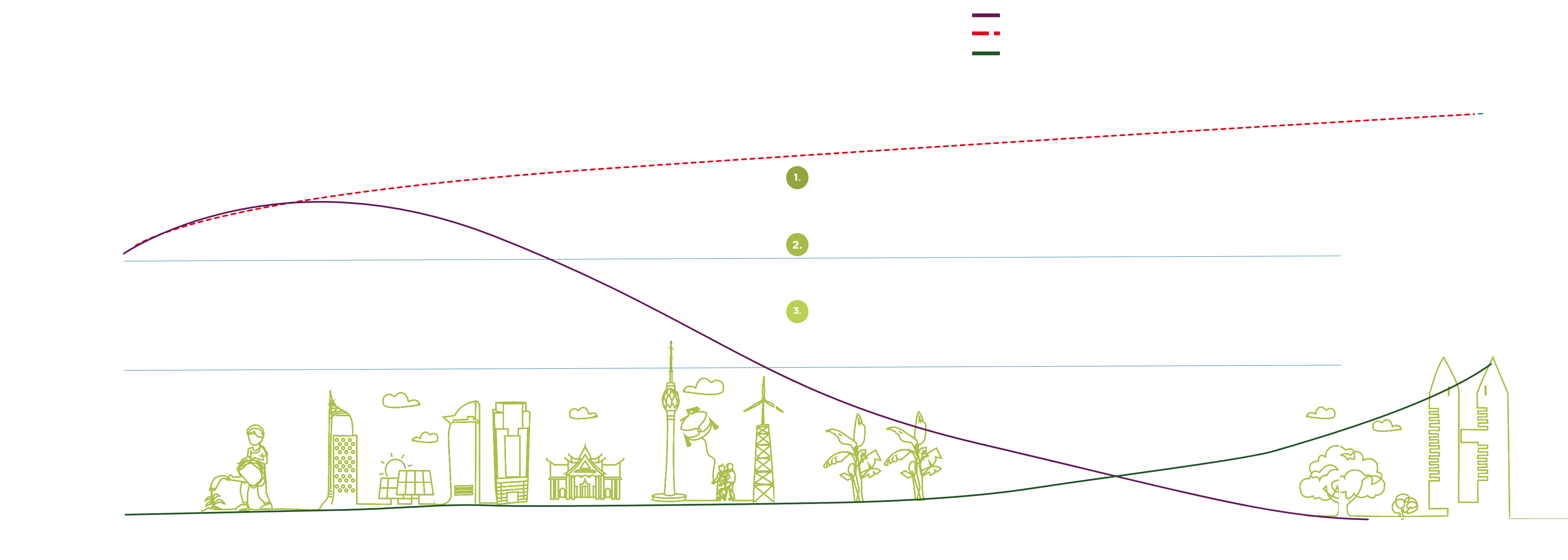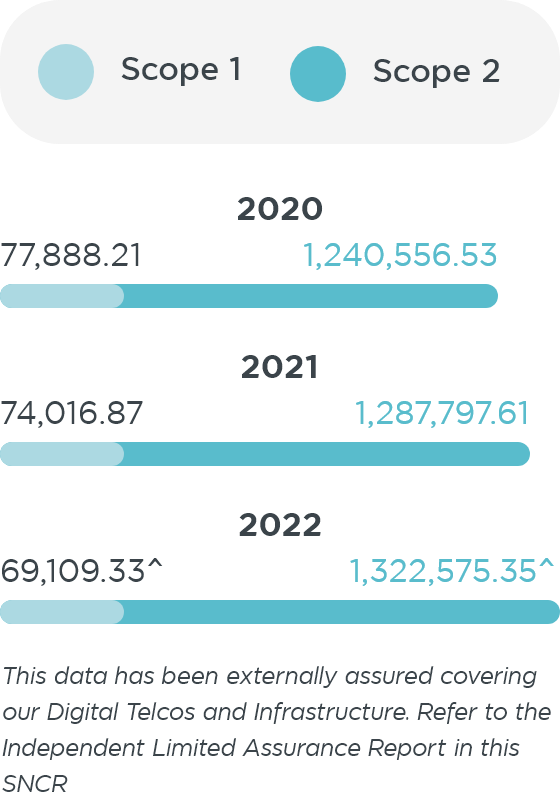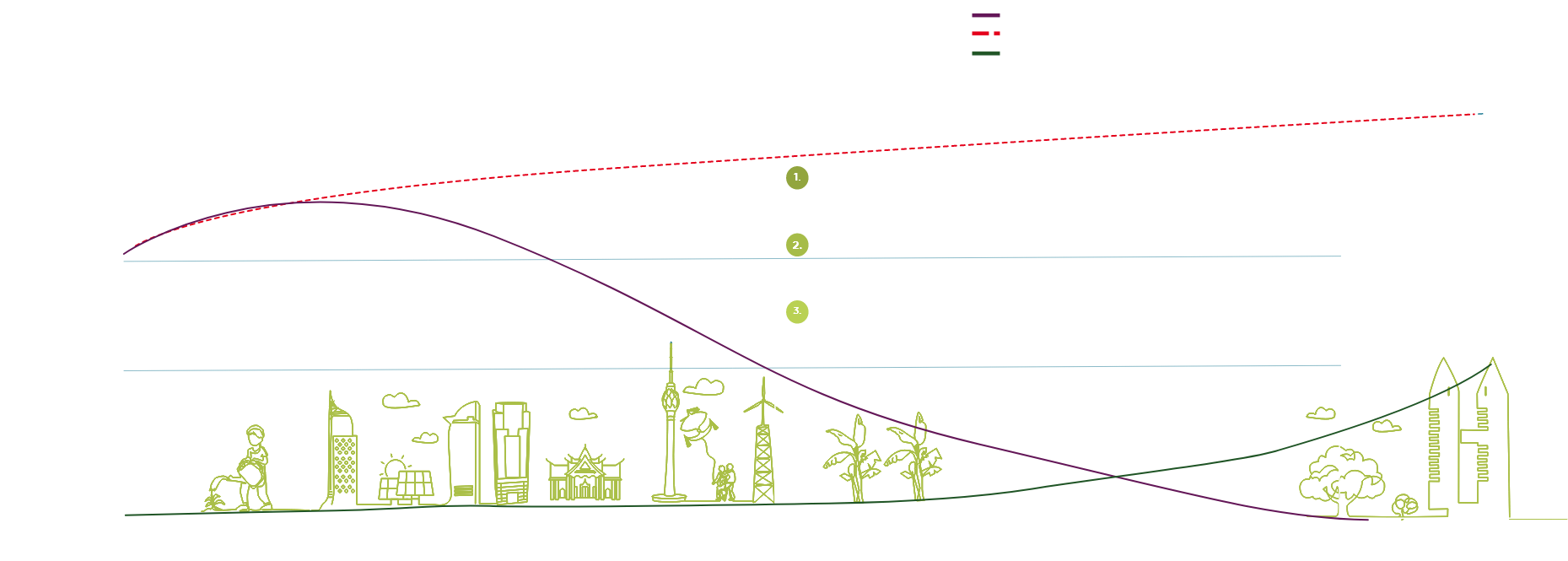
Advancing Green Economy
Climate Change

Advancing Green Economy
Climate Change
With the effects of climate change worsening by the year, we have a responsibility to take immediate and meaningful action in order to protect our business, our surrounding communities and the environment as a whole.
We are committed to establishing clear climate targets that are aligned with the Science Based Targets initiative (SBTi) Business Ambition for 1.5°C. Meanwhile, through our Net-Zero Carbon Roadmap, which was launched in May 2022, we have set a clear direction for the achievement of our climate ambition. The roadmap aligns our aspirations to the specific context of our operations, detailing specific objectives and climate actions that we commit to being held accountable for. Ultimately, our goal is to become a net-zero carbon company by 2050.
During 2022, we also adopted the recommendations of the Task Force on Climate-Related Disclosures (TCFD), supported by a three-year TCFD roadmap, enabling us to more effectively identify our climate-related risks and opportunities, and to better manage climate-related matters and disclosures.
Outlook
Our journey towards net-zero requires the building of transformative partnerships through collaborations within our industry, other industries and government agencies. Collectively this will enable bigger impacts as we transition towards a lower carbon economy.
On our SBTi targets, we will commence the validation process in 2023. As we progress towards meeting our goals, we are confident that there will be advancements in technologies, shifts in the regulatory landscape and increasing national-level action to expedite the transition to a low-carbon economy.
Adopting A Three-Objective Strategy
Our Net-Zero Carbon Roadmap is comprised of three objectives. This formalises our focus on decarbonising our operations, transforming our value chain and delivering an inclusive climate agenda to energise societal action.
Objective 1
ACCELERATE
DECARBONISATION OF OUR NETWORK OPERATIONS
Timeline: from 2020
TARGET
Reduce our operational network emissions (Scope 1 and 2) by 45% from a 2020 baseline by 2030
Objective 2
ACCELERATE
TRANSFORMATION OF OUR
VALUE CHAIN
Timeline: from 2023
TARGET
By the end of 2023, define our
Scope 3 baseline and set a reduction target
Objective 3
DELIVER AN INCLUSIVE
CLIMATE AGENDA
Timeline: from 2020
TARGET
Contribute to positive climate action through carbon removal and enable avoidance through technology and digitalisation
Objective 1
ACCELERATE
DECARBONISATION OF OUR NETWORK OPERATIONS
Timeline: from 2020
TARGET
Reduce our operational network emissions (Scope 1 and 2) by 45% from a 2020 baseline by 2030
Objective 2
ACCELERATE
TRANSFORMATION OF OUR
VALUE CHAIN
Timeline: from 2023
TARGET
By the end of 2023, define our
Scope 3 baseline and set a reduction target
Objective 3
DELIVER AN INCLUSIVE
CLIMATE AGENDA
Timeline: from 2020
TARGET
Contribute to positive climate action through carbon removal and enable avoidance through technology and digitalisation

Our network operations make up the largest portion of our emissions. We will decarbonise by increasing energy efficiency and renewable energy consumption from self-generation or purchased energy.
Our milestones:
- Verify 2020 Scope 1 and 2 emissions baseline
- Set science-based targets for Scope 1 and 2 by 2021
- Increase energy efficiency by 2030
- Set OpCo level CO2 reduction target by end 2022
- Increase purchase of renewable energy by 2030
We will contribute to enabling value chain positive climate impact, including contributing to reduce our suppliers operational carbon emissions.
Our milestones:
- Define Scope 3 baseline and set reduction target by end 2023
We will contribute to decarbonisation efforts across society, leveraging technology and digitalisation to execute carbon removal strategies while encouraging carbon avoidance.
Our milestones:
- Increase carbon removal activities by 2030
- Quantify the impact of positive climate action
1.
ACCELERATE DECARBONISATION OF OUR NETWORK OPERATION

Our network operations make up the largest portion of our emissions. We will decarbonise by increasing energy efficiency and renewable energy consumption from self-generation or purchased energy.
Our milestones:
- Verify 2020 Scope 1 and 2 emissions baseline
- Set science-based targets for Scope 1 and 2 by 2021
- Increase energy
efficiency by 2030 - Set OpCo level CO2 reduction target by end 2022
- Increase purchase of renewable energy by 2030
2.
ACCELERATE TRANSFORMATION OF OUR VALUE CHAIN

We will contribute to enabling value chain positive climate impact, including contributing to reduce our suppliers operational carbon emissions.
Our milestones:
- Define Scope 3 baseline and set reduction target by end 2023
3.
DELIVER AN INCLUSIVE CLIMATE AGENDA

We will contribute to decarbonisation efforts across society, leveraging technology and digitalisation to execute carbon removal strategies while encouraging carbon avoidance.
Our milestones:
- Increase carbon removal activities by 2030
- Quantify the impact of positive climate action
Objective 1:
Decarbonise Our Network Operations
The first objective of our Net-Zero Carbon Roadmap is about reducing emissions from our operations (Scope 1 and 2). Our approach centres on strengthening energy efficiency and identifying opportunities for the introduction of renewable energy sources. We also engage in dialogue with industry players, government authorities and communities, where we advocate for climate policies and investments that would help us reach our goals and achieve national climate ambitions.
Our Carbon Emissions Performance
In 2022, Group-wide carbon emissions increased by 2%. This can be attributed to the increase in our number of sites, the use of additional equipment across these sites, and emissions related to our efforts to enhance network quality and efficiency.
In 2022, we reviewed the boundary and data collection of our carbon emissions, excluding Digital Businesses from our carbon emissions calculations. We also incorporated updated Emission Factors (EF) into our emission calculations, resulting in a revised 2020 baseline and 2021 emissions.
In 2022, the Group underwent two significant changes which included the Celcom-Digi merger in Malaysia and Link Net acquisition in Indonesia.
Group Total Carbon Emission (tCO2e)

Our Energy Consumption Performance
Driven by our expanded business presence, Group-wide energy consumption increased by 3.3% in 2022. Close to 98% of the energy we consume is used to power our network.
We consumed 7.84 million GJ of energy in 2022
Indirect: 6.90 million GJ
Network Electricity: 86.48%
Facilities Electricity: 1.53%
Direct: 0.94 million GJ
Network Fuel: 11.92%
Facilities Fuel: 0.07%
Direct: 0.94 million GJ
Indirect: 6.90 million GJ
Network Fuel: 11.92%
Network Electricity: 86.48%
Facilities Fuel: 0.07%
Facilities Electricity: 1.53%
Our OpCos’ Renewable Energy Progress
During 2022, over 4,000 renewable sites were set up across our business footprint, a 15% increase on the year before.
Installed solar power panels at an additional 242 sites, taking its total to 857 sites, and realised a 18% decrease in fuel usage per site per month
Increased the penetration of its tower-mounted solar solutions to 311 sites, from 35 sites in 2021, enabling a reduction to its greenhouse gas (GHG) emissions and more optimised utilisation of land space for towers

Installed solar power panels at 169 sites, reducing its grid usage by 184,280 kWh and saving 55,635 litres of fuel for generators

EDOTCO’s Climate
Action Commitment
With the aim of balancing growth and environmental protection, our tower infrastructure company, EDOTCO launched its Sustainability Blueprint in July 2022.
The blueprint builds upon EDOTCO’s extensive climate action initiatives, which include the building of green telco towers with sustainable materials such as bamboo or carbon fibre, the electrification of sites for improved energy efficiency, and the tracking and monitoring of carbon data. Furthermore, to formalise its efforts and emissions targets, EDOTCO is currently developing a Carbon Neutrality Framework.
Our OpCos’ Energy Efficiency Progress

Implemented green Base Transceiver Station (BTS), using direct current fans and air conditioning to optimise energy efficiency. The process undertaken of modernising BTS equipment has reduced energy consumption by up to 50% since 2014.

Participated in the Cambodia Energy Efficiency Initiative organised by Sevea, forming a Green Team to enhance the effectiveness of on-ground implementation and drive employee engagement.

Deployed high-efficiency rectifiers at 250 sites and implemented Enabled Energy Saving Mode at 140 sites.
Objective 2:
Transform Our Value Chain
Our goal to reduce our carbon footprint goes beyond our operations and cuts across our value chain.
Scope 3 emissions are emissions that are outside the direct control of a company and occur across their value chain. They can typically make up more than two-thirds of a telco’s total carbon emissions footprint and sometimes more than 90%, and thus constitute a key area of focus.
As part of our efforts to reduce our Scope 3 emissions, we will engage and collaborate with our suppliers to inculcate emissions reduction practices, including by setting specific emissions standards that we require of all suppliers. Facilitating this, we have begun the process of establishing our Scope 3 targets in preparation for target validation by SBTi in 2023. As part of this process, Axiata Procurement Centre is actively engaging with our suppliers to explore better means of collaboration towards meeting our net-zero goals.
ACTION PLAN
Organisational preparedness:
Commence Scope 3 data collection training within all OpCos
Collaborations:
Design and collaborate with GSMA to define Scope 3 methodology
Scope 3 Data Collection
By end 2023:
Scope 3 emissions baseline established
Scope 3 emissions target determined
Advocacy and Collaboration Within Our Industry
At GSMA, we represent our operating markets within the Axiata Group. GSMA provides a platform for us to leverage on the sharing of best practices among peers and to collaborate towards contributing to the United Nations Sustainable Development Goals.
Significant initiatives include industry taskforces to drive climate action, where some of the ongoing work includes implementing Scope 3 data collection and target-setting for our industry.
See our Net-Zero Carbon Roadmap for more.
Objective 3:
Deliver An Inclusive Climate Agenda
While the digital sector is responsible for only 1.4% of global emissions, its technology has the potential to unleash a transformative effect on climate action efforts worldwide and could directly enable a third of the global emissions reductions needed by 2030.
With this in mind, our target is to contribute to positive climate action through carbon removal and enable avoidance through the targeted use of technology and digitalisation.
Increasing Carbon Removal Activities
Reaching climate goals requires strategies that not only reduce emissions but actively remove CO2 from the atmosphere.
We view carbon removal as a last resort and not an alternative to reach our net-zero commitment. Nevertheless, and in recognising the potential for carbon removal technologies to develop significantly in the coming years and decades, we will continue to explore the potential of investing in high-quality carbon removal solutions – whether natural or technological – as a long-term strategy.
Enabling Carbon Avoidance
Through the Enablement Effect, mobile network-enabled technologies form an important part of the decarbonisation solution, enabling rapid emission reductions while improving quality of life and supporting economic growth.
Cognisant of the potential that lies in our hands, we shall seek to drive carbon avoidance efforts across society by encouraging the adoption of digital technology and empowering digitalisation through our products and services.
Discover some of our ongoing initiatives via the Digitisation and Innovation section of this website.
See our Net-Zero Carbon Roadmap for more.
Adopting The TCFD Recommendations
We have bolstered our climate action efforts by embarking on our TCFD journey. In adopting the TCFD recommendations, we aim to improve the transparency and comparability of our climate disclosures, thereby driving the confidence of our stakeholders in our actions.
During our pilot year of 2022, we took the following key steps:
Worked with relevant partners and third-party expert to identify TCFD-related gaps from the previous year’s disclosures and practices
Shortlisted selected OpCos for the pilot assessment based on considerations such as exposure to natural hazards, revenue contribution and business segments
Identified and assessed climate-related risks and opportunities relevant to the selected OpCos
Selected suitable climate scenarios to be applied to evaluate the potential implications of the material climate risks and opportunities on our business, financial performance and resilience
Worked with relevant partners and third-party experts to identify TCFD-related gaps from the previous year’s disclosures and practices
Shortlisted selected OpCos for the pilot assessment based on considerations such as exposure to natural hazards, revenue contribution and business segments
Identified and assessed climate-related risks and opportunities relevant to the selected OpCos
Selected suitable climate scenarios to be applied to evaluate the potential implications of the material climate risks and opportunities on our business, financial performance and resilience
We are committed to closing any gaps in our climate action strategy by progressively expanding our TCFD scope and conducting more comprehensive climate risk and opportunity assessments. Our current report is based on the latest information and current practices available, and we expect to amend, update and improve our climate-related practices moving forward.
Earmarking Climate-Related Roles and Responsibilities

In order to drive accountability and concerted action towards reaching our climate ambitions, we have allocated specific roles and responsibilities to our Board Sustainability Committee, working level committees and OpCo-level sustainability teams. Read the Climate Change section of our Sustainability and National Contribution Report to learn more.
Identifying Climate-Related Risks and Opportunities
Cognisant of the varied risks associated with climate change, as well as the opportunities that the transition to a low-carbon economy presents, we conducted a comprehensive climate risk assessment in 2022. As a result of this pilot exercise, which involved five shortlisted OpCos, nine material risks and 11 material opportunities were identified and assessed, gauging their materiality and their potential impacts to our business.
As we identify, assess and manage risks and opportunities over the coming years, we will utilise climate scenario analysis to model the potential impacts of different climate scenarios on our operations, financial performance and value chain. With that, we have selected two climate scenarios against which we will assess our climate risks and opportunities as we move forward.
Scenario
Current Policies
Existing climate policies and actions to address climate change are insufficient to address commitments and targets, and remain unchanged
Aligned to a future with 3°C of warming
Net Zero 2050
New climate policies and investments are introduced to achieve commitments and targets, with aggressive actions taken to address climate change
Aligned to a future with 1.5-1.8°C of warming
Current Policies
Existing climate policies and actions to address climate change are insufficient to address commitments and targets, and remain unchanged
Aligned to a future with 3°C of warming
Net Zero 2050
New climate policies and investments are introduced to achieve commitments and targets, with aggressive actions taken to address climate change
Aligned to a future with 1.5-1.8°C of warming





